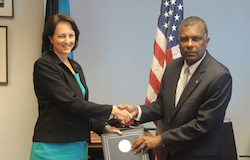The United States and the Bahamas have signed an agreement to facilitate combating transnational criminal activity on the islands, including the horrific crime of human trafficking.
On April 27, Lisa Johnson, US Charge d’Affaires, and Fred Mitchell, Bahamian Minister of Foreign Affairs and Immigration, formally signed the Seventh Amendment to the Letter of Agreement on Narcotics Control and Law Enforcement, reported Tribune242.
The amendment will result in Nassau receiving $2.74 million, which Johnson explained is meant to help “enhance the capabilities of the Royal Bahamas Police Force … support drug demand reduction … and to increase the Bahamas’ capability to investigate and prosecute crime.”
Mitchell called the significance of the new amendment “irrefutable,” saying it will help protect “our borders from the pernicious threats of money laundering, human trafficking, and the smuggling of illicit drugs and firearms.”
InSight Crime Analysis
Human trafficking — often identified as the world’s second most profitable crime — as been of increasing concern in the Bahamas in recent years. The State Department’s 2014 Trafficking in Persons Report (TIP) described the country as a “destination, source, and transit country for men, women, and children subjected to forced labor and sex trafficking.”
Migrant workers from Haiti were identified as especially vulnerable to involuntary servitude. Although migrants from China, Jamaica, and the Philippines also reportedly arrived to the Caribbean nation against their will.
SEE ALSO: Coverage of Human Trafficking
The TIP Report also says the Bahamas does not fully comply with minimum standards to address the problem, but it is making significant efforts to do so; noting how in March 2014 the country had its first conviction ever for human trafficking.
Other Caribbean nations are also on the US watch list for human trafficking. The Dominican Republic has especially been seen as a transit and source country for migrants, with human smuggling networks having been identified moving Dominican migrants into South America and Cubans into Puerto Rico.
Haiti is another significant source of forced labor, and the 2014 Global Slavery Index labeled it as having the highest percentage of its population living in slave-like conditions in the region.

